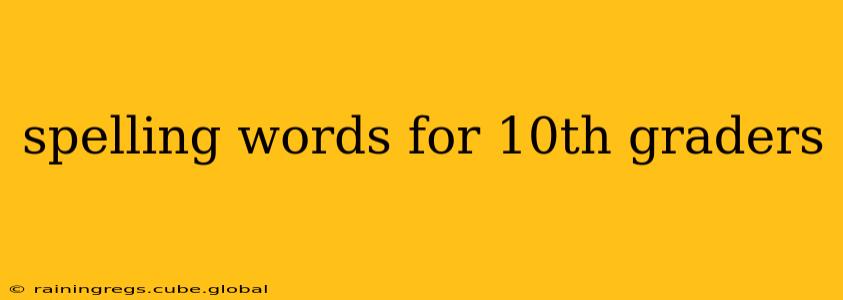Tenth grade marks a significant leap in academic vocabulary. Students are expected to not only spell correctly but also understand the nuances of complex words within their reading and writing. This guide provides a framework for tackling advanced spelling, encompassing strategies, word lists, and resources to help 10th graders conquer challenging vocabulary.
Why Focus on Spelling in 10th Grade?
Strong spelling skills are foundational to academic success. Beyond simply acing spelling tests, accurate spelling:
- Enhances credibility: In essays, reports, and other written work, correct spelling demonstrates attention to detail and professionalism.
- Improves comprehension: Understanding how words are spelled can aid in grasping their meaning and pronunciation.
- Boosts confidence: Mastering challenging words builds self-assurance in academic settings.
- Expands vocabulary: Learning to spell complex words naturally expands one's overall vocabulary.
Strategies for Effective Spelling Improvement
1. Understanding Word Roots, Prefixes, and Suffixes
Many complex words are built from smaller parts. Learning common roots, prefixes (word beginnings), and suffixes (word endings) can greatly simplify spelling. For example, understanding the root "scrib" (meaning "to write") helps in spelling words like scribe, scribble, inscription, and transcript.
2. Visual and Auditory Learning
Different learning styles prevail. Some students benefit from visualizing words, perhaps by writing them repeatedly or using flashcards with clear visuals. Others might find auditory learning more effective, through dictating words aloud or using audio-based learning resources.
3. Contextual Learning
Learning words within a sentence or paragraph helps students understand their meaning and how they are used. Reading widely and actively engaging with texts improves spelling indirectly by strengthening vocabulary acquisition.
4. Utilizing Mnemonics and Memory Aids
Creating memorable associations (mnemonics) can help with tricky words. For example, to remember the spelling of "necessary," you might think, "one 's' is necessary, but two 's's are excessive".
5. Regular Practice and Review
Consistent, focused practice is key. Regular spelling tests, quizzes, and word games can reinforce learning. Reviewing previously learned words helps to solidify them in long-term memory.
Sample Word Lists for 10th Grade
The following lists are categorized by difficulty and theme, offering diverse vocabulary practice:
List 1: Commonly Misspelled Words
- accommodation
- acknowledgment
- believe
- beginning
- definitely
- disappoint
- embarrass
- environment
- exaggerate
- existence
- fluorescent
- government
- immediately
- independent
- judgment
- maintenance
- necessary
- occasion
- occurrence
- opportunity
- parallel
- perceive
- persuade
- possession
- privilege
- receive
- recommend
- rhythm
- separate
- succeed
- superintendent
- surprise
- thorough
- truly
- understand
- until
- weird
List 2: Words Related to Literature and Language
- allegory
- anachronism
- antagonist
- assonance
- connotation
- denotation
- epigram
- euphemism
- hyperbole
- imagery
- metaphor
- metonymy
- narrative
- onomatopoeia
- oxymoron
- paradox
- personification
- protagonist
- simile
- symbolism
List 3: Words Related to Science and Technology
- acceleration
- algorithm
- biotechnology
- chromosome
- combustion
- correlation
- ecosystem
- electrolysis
- equilibrium
- evolution
- hypothesis
- photosynthesis
- polymer
- radiation
- revolution
- satellite
- synthesis
- telescope
- thermodynamics
- trajectory
Resources for 10th Grade Spelling Improvement
Numerous online resources and learning tools are available:
- Online dictionaries and thesauruses: These offer definitions, pronunciations, and often alternative spellings.
- Spelling games and apps: Many engaging games can make learning fun and interactive.
- Vocabulary-building websites and apps: These can provide word lists, quizzes, and other learning materials.
- Grammar and writing websites: Many websites offer grammar and writing exercises that indirectly improve spelling.
Frequently Asked Questions (FAQs)
What are some common spelling errors 10th graders make?
Common errors include confusing homophones (words that sound alike but have different meanings and spellings, like "their," "there," and "they're"), misusing silent letters, and struggling with words containing double consonants.
How can I make learning spelling more engaging?
Turn spelling practice into a game! Use flashcards, create word searches, or challenge classmates to spelling bees. The more enjoyable the process, the more likely you are to retain the words.
Are there any specific techniques for memorizing difficult words?
Break down complex words into smaller parts (prefixes, suffixes, roots). Use mnemonics, create visual aids, or write the words repeatedly. Practice in different contexts.
How much time should I dedicate to spelling practice each day?
Even 15-20 minutes of focused practice daily can make a significant difference. Consistency is key.
By implementing these strategies, using the provided word lists, and accessing available resources, 10th graders can significantly improve their spelling skills, enhancing their academic performance and overall confidence. Remember, consistent effort and engagement are vital to success.
